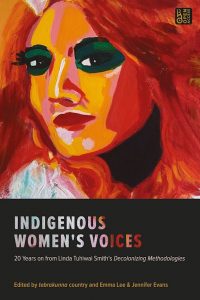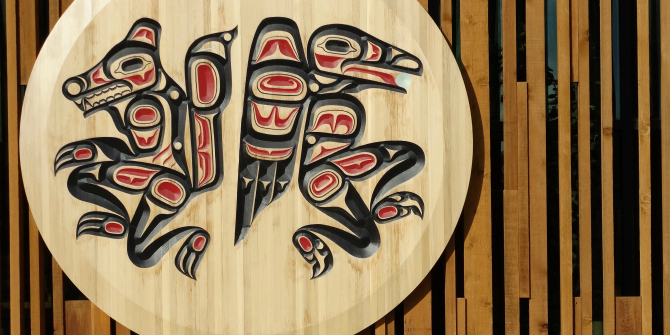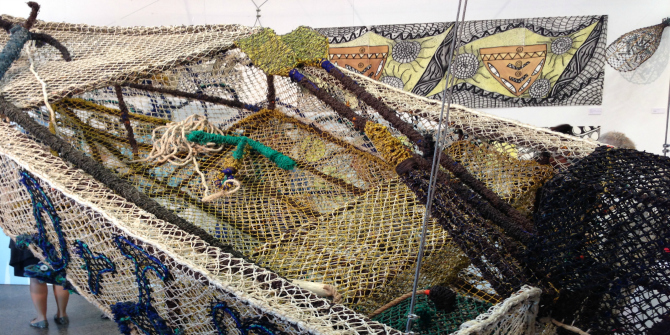Emma Lee and Jennifer Evans introduce their new collection Indigenous Women’s Voices: 20 Years On from Linda Tuhiwai Smith’s Decolonizing Methodologies – available open access from Bloomsbury – which celebrates the groundbreaking impact and enduring legacies of Linda Tuhiwai Smith’s seminal work.
Ringing out beautiful and clear: Indigenous Women’s Voices and the legacy of Linda Tuhiwai Smith’s Decolonizing Methodologies
 ‘You don’t ask the thieves to write your financial plan for you, so why would you think institutions can suddenly come up with a decolonising agenda themselves.’ This was Professor Linda Tuhiwai Smith’s answer in 2020, when asked about the trend of declarations to decolonise being made by institutions. It had been 20 years since Aunty Professor Tuhiwai Smith wrote her seminal work Decolonizing Methodologies: Research and Indigenous Peoples, and in the throes of completing her third edition, our academic Elder reminded us about the danger and dirtiness of research about and on Indigenous Peoples.
‘You don’t ask the thieves to write your financial plan for you, so why would you think institutions can suddenly come up with a decolonising agenda themselves.’ This was Professor Linda Tuhiwai Smith’s answer in 2020, when asked about the trend of declarations to decolonise being made by institutions. It had been 20 years since Aunty Professor Tuhiwai Smith wrote her seminal work Decolonizing Methodologies: Research and Indigenous Peoples, and in the throes of completing her third edition, our academic Elder reminded us about the danger and dirtiness of research about and on Indigenous Peoples.
As two Blak rookie early career researchers, a trawlwulwuy woman from tebrakunna country (Tasmania) and a Dharug woman living on palawa country, in lutruwita (Tasmania), we paid attention to Aunty Professor Tuhiwai Smith’s wise words. She stridently invited us to get on with our decolonising work, stating that ‘you don’t need a university to answer your questions for you’, but you do need to be alert to and monitor institutions and colonialism. It wasn’t hard for us to find inspiration from Decolonizing Methodologies, which has become a cornerstone of Indigenous research since its humble beginnings in 1999.
With a softback of Decolonizing Methodologies in our hands, we fell into her rich world where Indigenous Peoples and research meet, and in love with the truths of us and our Peoples that resonated deeply. In her pages, Aunty Professor Linda guides us through what decolonising methodologies mean, as not so much concerned ‘with the actual technique of selecting a method but much more with the context in which research problems are conceptualized and designed, and with the implications of research for its participants and communities’ (Smith 2012, page ix). Equally the power imbalances of colonising institutions and global imperialism are brought into the spotlight. Here decolonising methodologies are privileged as potent modes to ‘talk back to’ and ‘talk up to’ research, as redress to its claims, values and practices (Smith 2012).
Rich with signposts, from a vantage point of the colonised, Aunty Professor Linda clears the way through the murky terrain of Western research and the myriad of injuries it has caused, including the ‘othering’ of Indigenous Peoples in its wake. Decolonizing Methodologies is a masterclass in critiquing research done through imperial eyes. From a position of great strength, Aunty Professor Linda sets a new path toward articulating an Indigenous research agenda, celebrated by 25 Indigenous projects, all of which are updated via a refreshing decolonial approach in her third edition. These include insights for working from a place of decolonial love, healing, letting go, living in relation, Indigenous solutions, collectives and economies, instructions for future generations, justice, cultural labour, listening, feeling, and learning from the land.
Enduring in all editions is the eloquent and powerful representation of an Indigenous research agenda. Aunty Professor Linda lays out her model as metaphor of ocean tides, life-giving processes from four directions – ‘decolonization, healing, transformation and mobilization’ (Smith 1999, page 117). In her model, four major tides of ‘survival, recovery, development and self-determination’ speak to the conditions and states of Indigenous Peoples.

Image Credit: Photo of the West Coast of Tasmania by Dr Emma Lee
In 2022, with our volume Indigenous Women’s Voices: 20 Years On from Linda Tuhiwai Smith’s Decolonizing Methodologies, we respond to the critical need to celebrate and reflect on the legacy of Aunty Professor Linda’s book. Thirteen international Blak female voices from Canada, New Zealand, Australia and Finland write essays in tribute to Aunty Professor Linda in our collection, who has provided a foreword. We find space and voice for giving messages of strength, endurance, love and joy made possible through our decolonising work and methods. The essays privilege our Blak female bodies as we dance in our decolonising methodologies for our benefit, whilst pushing back against the Western academic canon. Our volume has five parts: country and connections; violence and safety; wisdom and knowledge; de/colonising minds; and seeing ourselves.
In country and connections, we respond to Aunty Professor Linda’s call to enact research that is unashamedly centred upon the lands and waters that give us life and identity. Through speaking to country as we would family, our spiritual and cultural worlds are revealed as embodied knowledge – we write into being our bodies as country. This is a necessary bulwark to protect us from Western harms, where violence and safety are daily meditations on how to survive the gross excesses upon us.
Two essays in this section guide us through the destabilising and terrorising acts against us as we navigate being Blak academics in the university sector, while also theorising Indigenous-specific forms of colonising violence as a Blak panopticon where no Indigenous person wins. For Indigenous Peoples, our Elders are paramount to our way of life and are an archive of our cultural practices and protocols that help us bridge the two-worlds of being. In wisdom and knowledge, two women articulate the power of familial and cultural Elders who shape the way we respond to the world, especially re-writing the white patriarchal histories that seek to erase our Blak female bodies. These essays give us a grounding to understand what a colonised mind looks like for an Indigenous woman. For in this section, we write on how to dismantle the colonial and decolonise the academy (and ourselves) by reclaiming the purpose of Indigenising education and research for liberal aims.
When we recover our colonised minds, we can then see ourselves and begin to reflect the experiences of being Blak women in spaces and places that have never welcomed us. The public spaces of galleries, libraries, archives and museums are a centrepoint of recording how we have been abused through the colonial experience and distorted in public realms. To push back against the institutions that create memory and narrative is to make the seismic change that decolonising research requires from us as Blak women.
However, to really see ourselves is to bear witness to the devastation of our lives and cultures through the experience of colonial erasure. To close out our celebration and tribute to Aunty Professor’s work, the final essay wrenches our comfort away and exposes us to the dispossession, exile and bullets upon Blak female bodies that cascade into generational trauma. It is here, in the disquiet and disorientating effects of the final essay, that we are free to see ourselves – by us and for us – rather than through the Western gaze.
Each essay, then, is an exploration and celebration of Indigenous womanhood and what we recognise as academic women’s business. ‘Women’s business to us is a celebration of the many forms of our female identities, including what we know also as Queer women’s business, which gives us the cultural authority to exercise such powers’ (tebrakunna country and Emma Lee & Jennifer Evans 2022, page 1). In writing these essays, our sista authors share some difficult and complex journeys as they navigate colonial structures whilst doing their decolonising work. The path we beat is both liberating and traumatic, also sustaining, and dangerous. We bring voices of a new generation with fresh insights from places around the world where Indigenous women are doing the heavy lifting of decolonising work, and we share what it means to us, our communities and kin to do Indigenous research well.
All the while we listen to the wisdom of our academic Elder, Aunty Professor Linda, who reminds us that our struggle is not over, and that we need to be vigilant to the signals and behaviours of ongoing colonisation. In the same interview we mentioned at the beginning of this post, Aunty Professor Linda reminds us that anti-racism is a commitment that institutions made 30 or 40 years ago, ‘but it’s still like a poster that’s in the women’s toilet’ that has been forgotten and ended up ‘kind of sitting there as part of the paintwork and become wallpaper’.
We hope that our volume inspires others in their decolonising work, that they can join us in tearing the wallpaper off the walls and take our message out into the daylight. The message we wish to share in our collection is that we live in our real world, from our Indigenous standpoints, and that we do not have to align ourselves with political frames. That rather, we can make and do our decolonising work as we see fit for our benefit, the benefit of our Peoples and our country and ancestral homelands.
Note: This feature essay gives the views of the authors, and not the position of the LSE Review of Books blog, or of the London School of Economics and Political Science. Thank you to Dr Emma Lee for providing the in-text image for this post.







